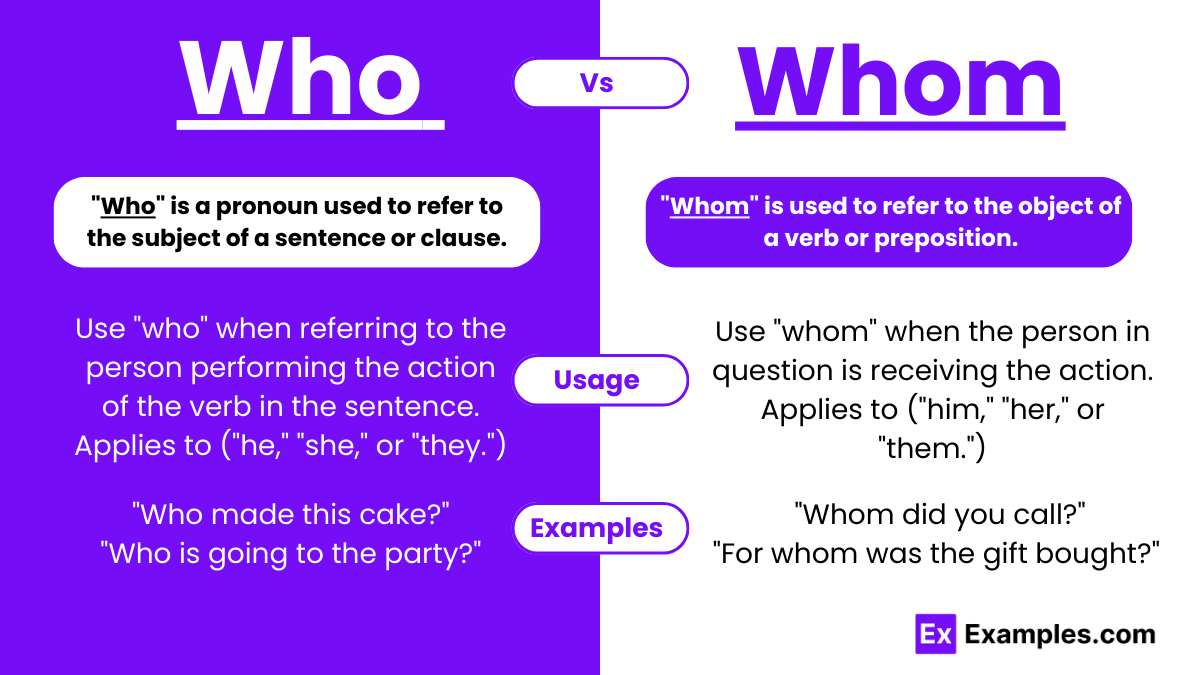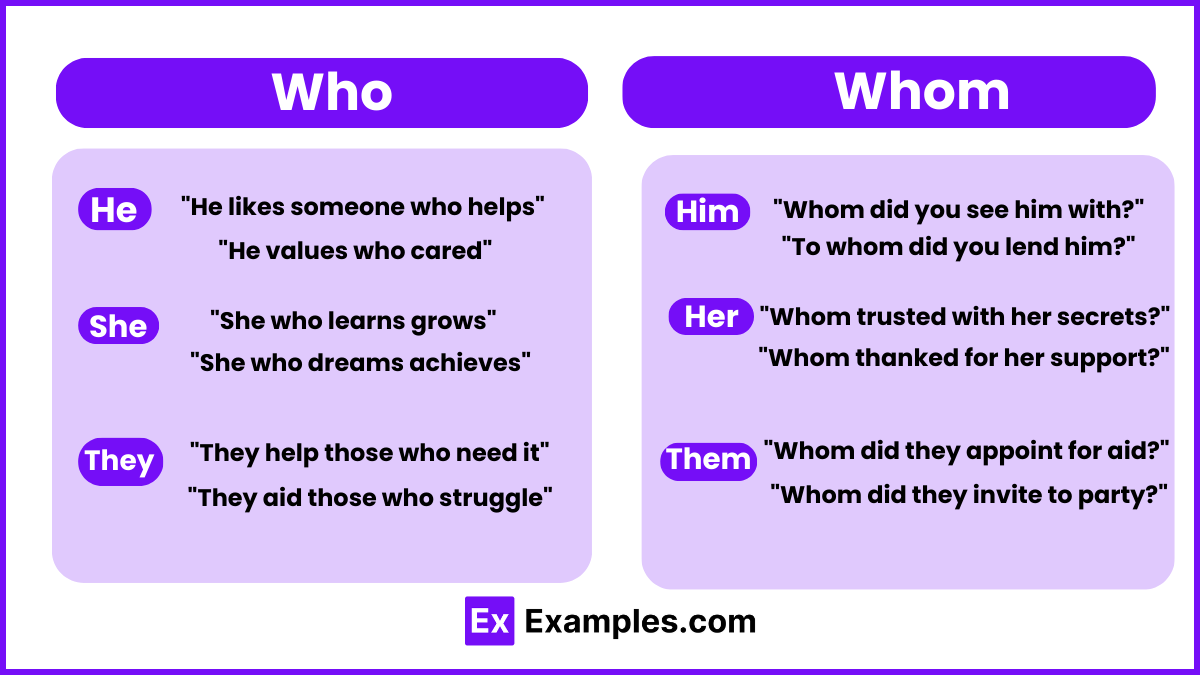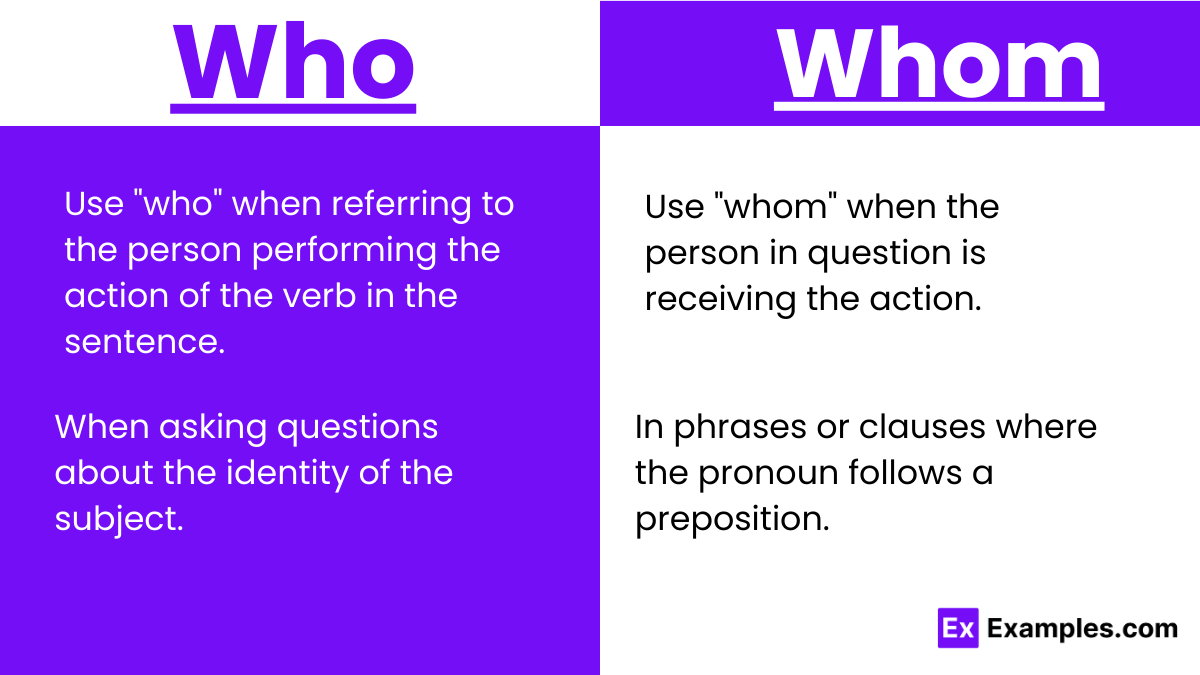Who vs Whom
Navigating the intricacies of the English language, students often encounter the challenge of distinguishing between “Who” and “Whom”. This grammatical conundrum, while seemingly daunting, plays a pivotal role in the structure and clarity of our sentences. By delving into the nuances of these two pronouns, learners can enhance their writing and speaking, ensuring precision and elegance in communication.
Understanding “Who” and “Whom” is more than a matter of memorization; it’s about grasping their functional roles within a sentence. This article aims to demystify these pronouns for students, breaking down the rules and applications in a straightforward, accessible manner. As we journey through examples and explanations, the goal is to arm young scholars with the knowledge to use “Who” and “Whom” confidently and correctly in any context.
Who and Whom – Meanings
Who: The Subject Pronoun
“Who” is a pronoun used to refer to the subject of a sentence or clause. It is utilized when asking about the identity or nature of a person or persons involved in an action. Essentially, “who” stands in for the ‘doer’ of an action, the one who is performing or carrying out an activity. For example, in the question, “Who wrote the novel?” “who” refers to the person responsible for the action of writing. It is the interrogative counterpart to subject pronouns like “he,” “she,” or “they” in statements.
Whom: The Object Pronoun
On the other hand, “whom” is used to refer to the object of a verb or preposition. It is the correct choice when the person in question is receiving an action or is the object of the sentence. “Whom” helps to identify the individual being acted upon or to whom something is directed. For instance, in the sentence, “To whom was the letter addressed?” “whom” is the recipient of the action (the letter being addressed). “Whom” aligns with object pronouns such as “him,” “her,” and “them” in statements.
Understanding the distinction between “who” and “whom” hinges on recognizing the roles of subjects and objects within sentences. This foundational knowledge not only refines grammatical accuracy but also polishes the art of communication.
Summary
“Who” and “whom” are pronouns with distinct roles in English grammar. “Who” serves as the subject pronoun, identifying the doer of an action within a sentence or question, like in “Who wrote the novel?” Conversely, “whom” is used as the object pronoun, indicating the recipient of an action or the object of a sentence, as seen in “To whom was the letter addressed?” Understanding the difference between these two pronouns is essential for grammatical accuracy and clarity in communication.
Difference Between Who and Whom
| Aspect | Who | Whom |
|---|---|---|
| Role in Sentence | Acts as the subject pronoun. | Serves as the object pronoun. |
| Function | Refers to the doer of an action. | Refers to the receiver of an action. |
| Usage in Questions | Used to ask about the identity or nature of the subject. Example: “Who is coming to the party?” | Used to inquire about the object or recipient. Example: “Whom did you invite to the party?” |
| Corresponding Pronouns | Aligns with subject pronouns like “he,” “she,” or “they.” | Aligns with object pronouns such as “him,” “her,” and “them.” |
| Preposition Placement | Rarely associated with prepositions in questions. | Often used with prepositions. Example: “With whom are you going?” |
| Formality | Commonly used in both formal and informal contexts. | More formal and often used in writing or formal speech. |
| Ease of Use | Generally considered easier and more intuitive to use. | Seen as more grammatically complex and less commonly used in everyday speech. |
| Substitutability Test | Can often be substituted with “he” or “she” in a rephrased sentence to test correctness. | Can be replaced with “him” or “her” in a rephrased sentence to check for accuracy. |
Tricks to Remember the Difference Between Who and Whom
Navigating the usage of “Who” vs “Whom” can be simplified with a few practical tricks. These methods aim to demystify the choice between these two pronouns, making it easier to decide which one fits perfectly in a sentence.
Trick 1: The He/She vs Him/Her Method
Explanation: If you can replace the word with “he” or “she” and the sentence still makes sense, use “who.” If “him” or “her” fits better, then “whom” is the way to go.
Example:
- Sentence: “___ wrote the report?”
- Test: “He wrote the report.” (Makes sense)
- Correct Usage: “Who wrote the report?”
Trick 2: Answer the Question
Explanation: Formulate an answer to the question you’re asking or the statement you’re making. If the answer uses a subject pronoun like “he” or “she,” “who” is correct. If the answer uses an object pronoun like “him” or “her,” use “whom.”
Example:
- Question: “To ___ was the letter addressed?”
- Answer: “The letter was addressed to him.”
- Correct Usage: “To whom was the letter addressed?”
Trick 3: The Preposition Pairing
Explanation: “Whom” is often the correct choice when it follows a preposition, such as “to,” “for,” “with,” etc. This is because the presence of a preposition usually indicates an object pronoun is needed.
Example:
- Sentence: “For ___ did you buy the gift?”
- Preposition Test: The preposition “for” suggests an object pronoun.
- Correct Usage: “For whom did you buy the gift?”
These tricks should help clarify the use of “who” and “whom,” making it easier to determine which pronoun to use in different contexts.
Who and Whom in Subordinate Clauses
Understanding the use of “who” and “whom” within subordinate clauses is essential for crafting grammatically correct and clear sentences. A subordinate clause, also known as a dependent clause, adds extra information to the main clause but cannot stand alone as a complete sentence. Here’s how “who” and “whom” function within these clauses:
“Who” in Subordinate Clauses
“Who” is used in subordinate clauses when referring to the subject, or the doer, of the action within that clause. It helps to link characteristics or actions to a subject in a more detailed way.
Example:
- I have a friend who loves to travel.
(The subordinate clause “who loves to travel” provides additional information about “a friend” and “who” is the subject performing the action of loving to travel.)
“Whom” in Subordinate Clauses
“Whom” is utilized in subordinate clauses when the clause is providing additional information about the object of an action or a preposition within the main clause.
Example:
- She’s the author whom the critics praised.
(In the subordinate clause “whom the critics praised,” “whom” is the object receiving the action of being praised by the critics.)
Examples of Who and Whom
Mastering the correct usage of “Who” and “Whom” is a crucial aspect of English grammar that enhances both written and spoken communication. These pronouns, each serving a distinct grammatical role, can sometimes be confusing. “Who” is used as a subject pronoun, referring to the person performing an action, while “Whom” functions as an object pronoun, indicating the person receiving an action or the object of a preposition.
Examples of “Who”
- Who is going to lead the project meeting today?
- I wonder who left this gift on my desk.
- Who has the keys to the storage room?
- Can you tell me who called earlier?
- Who was the first person to climb Mount Everest?
Examples of “Whom”
- To whom should I address this letter of complaint?
- Whom did you see at the concert last night?
- The manager, whom you met yesterday, will join us for lunch.
- Whom are you going to invite to the dinner party?
- She asked whom the book was borrowed from
When to Use Who and Whom
Understanding when to use “who” and “whom” is crucial for constructing grammatically correct sentences and conveying ideas clearly. Here’s a guide to help you navigate their usage:
Using “Who”
“Who” functions as a subject pronoun, similar to “he,” “she,” or “they.” It is used:
- To Refer to the Subject: Use “who” when referring to the person performing the action of the verb in the sentence.
- Example: “Who made this cake?”
- In Interrogative Sentences: When asking questions about the identity of the subject.
- Example: “Who is going to the party?”
Using “Whom”
“Whom” serves as an object pronoun, akin to “him,” “her,” or “them.” It is used:
- To Refer to the Object of a Verb or Preposition: Use “whom” when the person in question is receiving the action.
- Example: “Whom did you call?”
- After Prepositions: In phrases or clauses where the pronoun follows a preposition.
- Example: “For whom was the gift bought?”
Tips for Deciding Between “Who” and “Whom”
- Rephrasing the Sentence: Try rephrasing the sentence with “he/she” or “him/her.” If “he/she” fits, use “who.” If “him/her” fits, “whom” is likely the correct choice.
- Question Format: When forming questions, think about whether the answer would involve a subject (“who”) or an object (“whom”).
- Preposition Presence: If the pronoun follows a preposition, “whom” is generally the right choice.
Mastering the use of “who” and “whom” enhances your written and spoken English by ensuring grammatical precision and sophistication.
FAQs
What is the Rule of Who and Whom?
The rule is simple: use “who” as the subject (the one doing the action) and “whom” as the object (the one receiving the action) in sentences. “Who” is for subjects, like “he” or “she,” and “whom” is for objects, similar to “him” or “her.”
How Do You Use Who or Whom Correctly?
To use “who” or “whom” correctly, determine if the pronoun is the subject or object in the sentence. If it’s performing an action, “who” is appropriate. If it’s receiving an action, opt for “whom.” Example: “Who (subject) called you?” vs. “Whom (object) did you call?”
Who Did I Offend or Whom Did I Offend?
“Whom did I offend?” is correct. In this question, “whom” is the object of the offense, receiving the action. The sentence structure implies that someone (the object) was offended by the speaker’s actions, making “whom” the appropriate choice.





